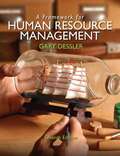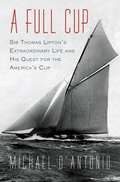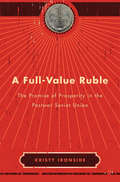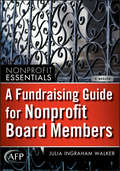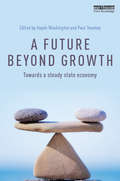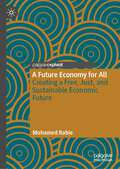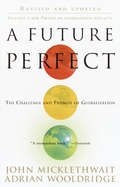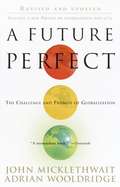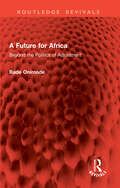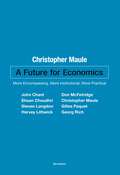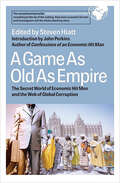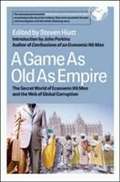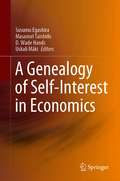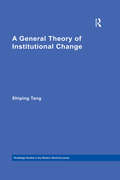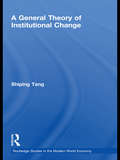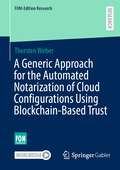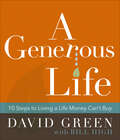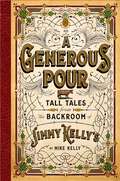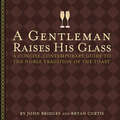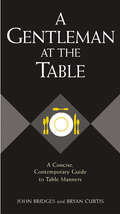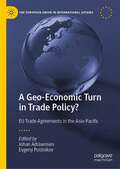- Table View
- List View
A Framework for Human Resource Management (Seventh Edition)
by Gary DesslerA Framework for Human Resource Management provides readers and practicing managers with a concise yet thorough review of essential HR management concepts-including fundamental practices, methods, topics, and relevant legal findings-in a highly readable and accessible format.
A Framework for Process Development
by Gary P. PisanoThis chapter discusses how process development fits into a firm's larger competitive, technological, organizational, and operational environments and develops a framework focusing on the learning that takes place during process development and the role of knowledge in shaping strategies for learning.
A Framework for Understanding Racial Disadvantage within Organizations
by Anthony J. Mayo Alexandra C Feldberg Letian ZhangIndustry and Background Note
A Full Cup
by Michael D'AntonioToday Lipton means tea. However, in his time Sir Thomas Lipton was known for much more than the Lipton tea empire. Raised in desperate poverty, he would build a global empire of markets, factories, plantations, and stockyards. But his epic pursuit of the America's Cup--a yachting trophy and the ultimate in international sport--made him a beloved figure on both sides of the Atlantic. More than a story of innovation and achievement, A Full Cup also explores Lipton's most intriguing creation: his public persona, formed by a burgeoning mass media and a shameless self-promotion that made him one of the most recognizable figures of his time. Michael D'Antonio brings to life the surprising careers of this intrepid sailor, gregarious showman, and ingenious self-made millionaire--the world's very first celebrity CEO.
A Full-Value Ruble: The Promise of Prosperity in the Postwar Soviet Union
by Kristy IronsideA new history shows that, despite Marxism’s rejection of money, the ruble was critical to the Soviet Union’s promise of shared prosperity for its citizens. In spite of Karl Marx’s proclamation that money would become obsolete under Communism, the ruble remained a key feature of Soviet life. In fact, although Western economists typically concluded that money ultimately played a limited role in the Soviet Union, Kristy Ironside argues that money was both more important and more powerful than most histories have recognized. After the Second World War, money was resurrected as an essential tool of Soviet governance. Certainly, its importance was not lost on Soviet leaders, despite official Communist Party dogma. Money, Ironside demonstrates, mediated the relationship between the Soviet state and its citizens and was at the center of both the government’s and the people’s visions for the maturing Communist project. A strong ruble—one that held real value in workers’ hands and served as an effective labor incentive—was seen as essential to the economic growth that would rebuild society and realize Communism’s promised future of abundance. Ironside shows how Soviet citizens turned to the state to remedy the damage that the ravages of the Second World War had inflicted upon their household economies. From the late 1940s through the early 1960s, progress toward Communism was increasingly measured by the health of its citizens’ personal finances, such as greater purchasing power, higher wages, better pensions, and growing savings. However, the increasing importance of money in Soviet life did not necessarily correlate to improved living standards for Soviet citizens. The Soviet government’s achievements in “raising the people’s material welfare” continued to lag behind the West’s advances during a period of unprecedented affluence. These factors combined to undermine popular support for Soviet power and confidence in the Communist project.
A Fundraising Guide for Nonprofit Board Members
by Julia I. WalkerEverything you need to know as a nonprofit board member to raise more money and help your organization succeed in meeting its goals Engaging and informative, this practical guide to fundraising contains valuable insights that nonprofit boards need to succeed in raising money in today's dynamic economic environment. While written expressly for board members, this useful handbook also provides advice to executive directors and advancement staff on how to partner with your board to build an unstoppable fundraising team. A Fundraising Guide for Nonprofit Board Members shows you how to raise more money by building board leadership and skills in fundraising. This book covers it all--the board's leadership role in fundraising; how to organize and train your board to raise funds; building a team with board and staff; raising funds for operations, major gifts and capital campaigns; how to ask for gifts; plus a guide for conducting a board retreat that will lead to fundraising success. Demystifies the ask by providing a straightforward guide on how to ask for, and close, gifts Features case studies, real life examples, and checklists in an easy to reference format Offers sample materials for a board retreat on building the successful fundraising team Also by Julia Ingraham Walker: Nonprofit Essentials: Jump-Starting the Stalled Fundraising Campaign Entertaining, practical, and easy to use, this book will become a must-read for all board members, executive directors, and staff who want to build an effective fundraising team.
A Future Beyond Growth: Towards a steady state economy
by Haydn Washington Paul TwomeyThere is a fundamental denial at the centre of why we have an environmental crisis – a denial that ignores that endless physical growth on a finite planet is impossible. Nature provides the ecosystem services that support our civilisation, thus making humanity unavoidably dependent upon it. However, society continues to ignore and deny this dependence. A Future Beyond Growth explores the reason why the endless growth economy is fundamentally unsustainable and considers ways in which society can move beyond this to a steady state economy. The book brings together some of the deepest thinkers from around the world to consider how to advance beyond growth. The main themes consider the deep problems of the current system and key aspects of a steady state economy, such as population; throughput and consumerism; ethics and equity; and policy for change. The policy section and conclusion bring together these various themes and indicates how we can move past the growth economy to a truly sustainable future. This volume will be of great interest to students and scholars of economics, sustainability and environmental studies in general.
A Future Economy for All: Creating a Free, Just, and Sustainable Economic Future
by Mohamed RabieThis book journeys through human history, beginning with the tribal age and ending with an option for what's to come after the knowledge age. It examines the profound influence that culture, civilization, and materialism have on the distribution of wealth, knowledge, and power. It critically examines the shortcomings of current education and healthcare systems, shedding light on the difficulties nations face in effectively addressing the needs of citizens and population including refugees. The author challenges the existing societal frameworks, advocating for the adoption of novel political and economic systems firmly grounded in the principles of justice, freedom, and equity. At the core of this is a folk-political system that values productivity and empowers workers and workforces to innovate.Written for a discerning audience of economists, policymakers, scholars, and students, the book shifts the paradigm of the knowledge age away from issues with power and toward a future that values justice, freedom, and sustainability. Readers will gain invaluable insights into reshaping our societies, fostering inclusive economic growth, and ensuring a better world for all.
A Future Perfect
by John Micklethwait Adrian WooldridgeA Future Perfect is the first comprehensive examination of the most important revolution of our time--globalization--and how it will continue to change our lives. Do businesses benefit from going global? Are we creating winner-take-all societies? Will globalization seal the triumph of junk culture? What will happen to individual careers? Gathering evidence worldwide, from the shantytowns of São Paolo to the boardrooms of General Electric, from the troubled Russia-Estonia border to the booming San Fernando Valley sex industry, John Micklethwait and Adrian Wooldridge deliver an illuminating tour of the global economy and a fascinating assessment of its potential impact.From the Trade Paperback edition.
A Future Perfect: The Challenge and Promise of Globalization
by John Micklethwait Adrian WooldridgeA Future Perfect is the first comprehensive examination of the most important revolution of our time--globalization--and how it will continue to change our lives. Do businesses benefit from going global? Are we creating winner-take-all societies? Will globalization seal the triumph of junk culture? What will happen to individual careers? Gathering evidence worldwide, from the shantytowns of São Paolo to the boardrooms of General Electric, from the troubled Russia-Estonia border to the booming San Fernando Valley sex industry, John Micklethwait and Adrian Wooldridge deliver an illuminating tour of the global economy and a fascinating assessment of its potential impact.
A Future for Africa: Beyond the Politics of Adjustment (Routledge Revivals)
by Bade OnimodeFirst published in 1992, A Future for Africa looks at the crises plaguing the Africa’s societies and economies and argues convincingly that the problems are not insuperable, but that, though their causes are largely external, the only long-term solutions rest in African hands.In this book, the author shows how the adjustment programmes imposed on many African countries by the World Bank and the IMF have compounded the disastrous impact of foreign debt, trade restrictions and falling export prices. Real development will only be achieved, he maintains, by returning control of Africa’s abundant resources to its people and by ensuring greater democracy and accountability in African political structures.
A Future for Economics: More Encompassing, More Institutional, More Practical
by Gilles Paquet Ehsan Choudhri Steven Langdon Harvey Lithwick John Chant Don McFetridge Georg RichEconomics is a discipline fundamentally concerned with effective coordination. In that way, its main concerns are very close to those of governance. Economics, like governance, has evolved considerably over the last half century. This book is a very modest attempt at gauging the relative importance of this tsunami and the way in which it might indicate what will be its future. A Future for Economics proposes the reflections on this general theme by eight senior members of the economics profession who have all taught at some time in the Department of Economics at Carleton University in Ottawa a department that has always been known for its intellectual temerity and for its interest in extending the scope of economics beyond its traditional boundaries. The Carleton sample of economists who share their views here have practiced in different sub-fields of economics, and have chosen to articulate their views and experiences in very different ways. But their collective experience reflects a broad exposure to the ways in which the discipline has evolved both in academic circles and in the various organizations and institutions where they have practiced their profession in Canada and abroad.
A Game As Old As Empire: The Secret Word of Economic Hit Men and the Web of Global Corruption
by Steven HiattJohn Perkins&’ controversial and bestselling exposé, Confessions of an Economic Hit Man, revealed for the first time the secret world of economic hit men (EHMs). But Perkins&’ Confessions contained only a small piece of this sinister puzzle. The full story is far bigger, deeper, and darker than Perkins&’ personal account revealed. Here other EHMs, journalists, and investigators join Perkins to tell their own stories, providing the first probing and expansive look into this pervasive web of systematic corruption. With chapters spotlighting how specific countries around the globe have been subverted, A Game As Old As Empire uncovers the inner workings of the institutions behind these economic manipulations. The contributors detail concrete examples of how the &“economic hit man game&” is still being played: an officer of an offshore bank hiding hundreds of millions of dollars in stolen money, IMF advisers slashing Ghana&’s education and health programs, a mercenary defending a European oil company in Nigeria, a consultant rewriting Iraqi oil law, and executives financing warlords to secure supplies of coltan ore in Congo. Together they show how this system of corruption and plunder operates in real life, and reveal the price that the rest of the world must pay as a result. Most important, A Game As Old As Empire connects the dots, showing how the various pieces of this system come together to create the world&’s first truly global empire.
A Game as Old as Empire: The Secret World of Economic Hit Men and the Web of Global Corruption
by Steven HiattThis may well be the most pivotal and exciting time in the history of a nation that is built on pivotal and exciting events. How you and I choose to react to this global empire in the coming years is likely to determine the future of our planet. Will we continue along a road marked by violence, exploitation of others, and ultimately the likelihood of our self-destruction as a species? Or will we create a world our children will be proud to inherit? The choice is ours--yours and mine.
A Genealogy of Self-Interest in Economics
by Uskali Mäki Susumu Egashira D. Wade Hands Masanori TaishidoThis is the first book to describe the entire developmental history of the human aspects of economics. The issue of “self-interest” is discussed throughout, from pre-Adam Smith to contemporary neuroeconomics, representing a unique contribution to economics. Though the notion of self-interest has been interpreted in several ways by various schools of economics and economists since Smith first placed it at the heart of the field, this is the first book to focus on this important but overlooked topic. Traditionally, economic theory has presupposed that the core of human behavior is self-interest. Nevertheless, some economists, e.g. recent behavioral economists, have cast doubt on this “self-interested” explanation. Further, though many economists have agreed on the central role of self-interest in economic behavior, each economist’s positioning of self-interest in economic theory differs to some degree. This book helps to elucidate the position of self-interest in economic theory. Given its focus, it is a must-read companion, not only on the history of economic thought but also on economic theory. Furthermore, as today’s capitalism is increasingly causing people to wonder just where self-interest lies, it also appeals to general readers.
A General Theory of Institutional Change (Routledge Studies In The Modern World Economy Ser.)
by Shiping TangInstitutional change is a central driving force behind social changes, and thus a central topic in all major fields of social sciences. Yet, no general theory of institutional change exists. Drawing from a diverse literature, this book develops a general theory of institutional change, based on a social evolutionary synthesis of the conflict approach and the harmony approach. The book argues that because the whole process of institutional change can be understood as a process of selecting a few ideas and turning them into institutions, competition of ideas and struggle for power to make rules are often at the heart of institutional change. The general theory not only integrates more specific theories and insights on institutional change that have been scattered in different fields into a coherent general theory but also provides fundamental new insights and points to new directions for future research. This book makes a fundamental contribution to all major fields of social sciences: sociology (sociological theory), political sciences, institutional economics, and political theory. It should be of general interest to scholars and students in all major fields of social science.
A General Theory of Institutional Change (Routledge Studies in the Modern World Economy)
by Shiping TangInstitutional change is a central driving force behind social changes, and thus a central topic in all major fields of social sciences. Yet, no general theory of institutional change exists. Drawing from a diverse literature, this book develops a general theory of institutional change, based on a social evolutionary synthesis of the conflict approach and the harmony approach. The book argues that because the whole process of institutional change can be understood as a process of selecting a few ideas and turning them into institutions, competition of ideas and struggle for power to make rules are often at the heart of institutional change. The general theory not only integrates more specific theories and insights on institutional change that have been scattered in different fields into a coherent general theory but also provides fundamental new insights and points to new directions for future research. This book makes a fundamental contribution to all major fields of social sciences: sociology (sociological theory), political sciences, institutional economics, and political theory. It should be of general interest to scholars and students in all major fields of social science.
A Generic Approach for the Automated Notarization of Cloud Configurations Using Blockchain-Based Trust (FOM-Edition Research)
by Thorsten WeberThe use of cloud applications is becoming increasingly popular due to their scalability and cost advantages. However, companies need help in adopting cloud applications due to their internal policies and compliance requirements. Trust and security are crucial factors that influence the adoption of cloud applications. This book proposes a cloud architecture that addresses this challenge by shifting the trust for compliance-driven configurations of cloud applications from the cloud application provider to the blockchain. The architecture was developed using design science research and evaluated using mixed-method semi-structured guided interviews. The results show that the proposed architecture can significantly reduce adoption risk due to compliance-driven cloud application configurations, shifting trust from the cloud provider to the blockchain. This book presents an innovative approach to address the challenge of adopting cloud applications, and enhancing trust and security for businesses.
A Generous Life: 10 Steps to Living a Life Money Can't Buy
by David Green Bill High"Does my life make a difference?" People of all ages and stages of life want to live a life that has meaning and extends beyond their years on earth. In A Generous Life, Hobby Lobby founder David Green suggests readers start now to adopt a lifestyle of generosity.As the founder and CEO of the largest privately owned arts and crafts retailer in the world, David has amassed material wealth, yet has learned the secret of generous living. As someone who gives away half of his profits to charity, lives with integrity and faith, and enjoys the peace of crafting a legacy now, David has found peace and fulfillment.A Generous Life:guides you through ten simple but life-changing action stepshelps you establish a generous mindset, determine where and how much to give, how to create a family legacy plan, and moreteaches you how to identify your blessings—friendships, family, work, education, or talentsThis beautiful hardcover book has a ribbon marker and a section for you to personalize a family legacy plan of your own. A Generous Life is a thoughtful gift for:Christians looking for ways to connect with their purpose and faithhousewarming parties, baby showers for new parents, or college graduatesfans of Hobby Lobby and founder DavidWith practical helps on everything from deciding what you want your legacy to be to talking about money with your children, A Generous Life helps you start right where you are. You are richer than you know—and when you give it back to our generous God, your true wealth will never end.
A Generous Pour: Tall Tales from the Backroom of Jimmy Kelly's
by Mike KellyThe story of Jimmy Kelly&’s Steak House, Nashville's oldest fine restaurant, and the family who started it—of stills, saloons, and speakeasies, and of a family who was tough and resourceful, who lost everything, and picked themselves up and started again. When young James Kelly fled the Irish Famine in 1848, he arrived in America with a roll of copper tubing under his shirt. To make whiskey, of course. And he did—in the green rolling hills of Middle Tennessee. Later his son John would open a saloon, initiating the family custom of serving up &“a great steak and a generous pour of whiskey&” that continues to this day. Readers will delight in tales of bootleggers and rumrunners, saloons and speakeasies, of hard workers with strong family values, the old genteel Nashville and the new Nashville recording industry, and the mysterious difference between whiskey and bourbon. There are stories about Jack Daniel, Roy Rogers and Dale Evans (and even Trigger), Al Capone, Bob Dylan, Grantland Rice, John Jay Hooker Sr., and local characters only a Nashvillian could love. The story of the Kelly family in Tennessee takes readers from the Civil War to Nashville&’s postwar boom and the turn of a new century: the Roaring 20s that followed the first World War, the temperance movement that led to Prohibition, and the speakeasy solution that led honest Kelly men to defy a patently bad law as they built a family legacy of beloved restaurants in Nashville. Mike Kelly—James&’s great-grandson—has written a fine and rollicking tale of a most interesting time in American history. His affection for his family and his community shows on every page.
A Gentleman Raises His Glass: A Concise, Contemporary Guide to the Noble Tradition of the Toast
by Bryan Curtis John BridgesA concise guide to giving meaningful, appropriate toasts for virtually any occasion, from the author of How to Be a Gentleman.A Gentleman Raises His Glass teaches how to prepare a toast for virtually any occasion—be it a wedding, a celebratory dinner, or any social celebration where a tribute would be welcome. It also tells the history of the toast, gives examples of the right and wrong things to say, and contains more than fifty aphorisms on toasting:A gentleman knows that, unless he is seated in a crowded public restaurant, he must stand to deliver a toastWhen a gentleman makes a toast, he makes it directly to his guest of honor, not to the table at largeA gentleman knows that a toast, even at a bachelor’s dinner, is still intended to be a tribute—not an embarrassment
A Gentleman at the Table: A Concise, Contemporary Guide to Table Manners (Gentlemanners)
by Bryan Curtis John BridgesGain the knowledge you need to maneuver any dining situation - from a casual meal of fried chicken at mom's house to a seven-course dinner at the finest restaurant in the world.A Gentleman at the Table will give any man the knowledge he needs to maneuver any dining situation - from a casual meal of fried chicken at his mom's house to a seven-course dinner at the finest restaurant in the world. It includes. . .How to set a tableHow to pronounce more than 100 unusual food namesHow to use obscure eating utensilsHow to perform the Heimlich maneuverHow to eat more than 25 foods that are challenging to eat gracefully such as lobster, snails, fried chicken, and pasta.In a society where more and more people eat with plastic forks and spoons at fast food restaurants, it is still important that a man know proper dining etiquette. There are still situations where not knowing what a finger bowl is or not knowing how to pronounce an item on a menu can have an effect on what others think of you. Showing he has little working knowledge of table manners at a lunch meeting or on a job interview over dinner may have an important impact on a man's life.Like all the books in the GentleManners series, A Gentleman at the Table is easy to use, non-threatening, and an entertaining read.
A Gentleman of Substance
by Richard FeltoeA Gentleman of Substance covers the remarkable life of John Redpath. Born to humble circumstances in Scotland in 1796, he emigrated to Canada in 1816 to become a stonemason in Montreal. By 1818 he had his own building and contracting firm and was working on the Lachine Canal as well as much construction and restoration work on buildings in Montreal. His work on the Rideau Canal, as contracted by Colonel John By, established his business reputation, while his leadership within the Presbyterian Church stabilized his position in the community. His involvement in the political and military life of Montreal is traced from before the 1837 Rebellion period through to his involvement with the Annexation Movement, making him an obvious candidate for the Montreal City Council. The author traces John Redpath’s upwardly mobile social status, his friendship with Peter McGill, and his acceptance into the elite society of Montreal, earning him a place within the coveted “Square Mile.” Despite a rigorous business schedule and extensive family responsibilities (he fathered 17 children), he was a frequent benevolent contributor to community needs, as well as participating on numerous Boards and Committees and contributing to the shaping of the urban design of Montreal. Attention is given to his expansive home, Terrace Bank, the subsequent subdivision of his estate and the early residential expansion of Montreal, and to his founding of the Canada Sugar Refinery and its growth.
A Geo-Economic Turn in Trade Policy?: EU Trade Agreements in the Asia-Pacific (The European Union in International Affairs)
by Johan Adriaensen Evgeny PostnikovContemporary trade policy is increasingly framed in geo-strategic terms. But how much of that rhetoric is reflected in actual policy choices by the EU or its trading partners? This book provides a first systematic study of the broader international context in which EU trade agreements are conceived, negotiated, and designed. Building on a refined conceptualisation of geo-economics, the book develops a cogent framework that combines insights from scholarship on the design of free trade agreements with ideas from foreign policy analysis. Empirically, the analysis focuses on the relations between the EU and the Asia-Pacific. Following the United States’ pivot to Asia and the EU’s Global Europe strategy, China’s backyard has become the main arena in which global powers’ geo-economic strategies overlap. Building on a series of case-studies, combining the perspectives from the EU and its trading partners, the book shows that the rhetoric of geo-economic competition is yet to catch up with the actual negotiation and design of free trade agreements. This volume will be of great interest to scholars, students and practitioners who want to gain a holistic understanding of contemporary trade negotiations.
